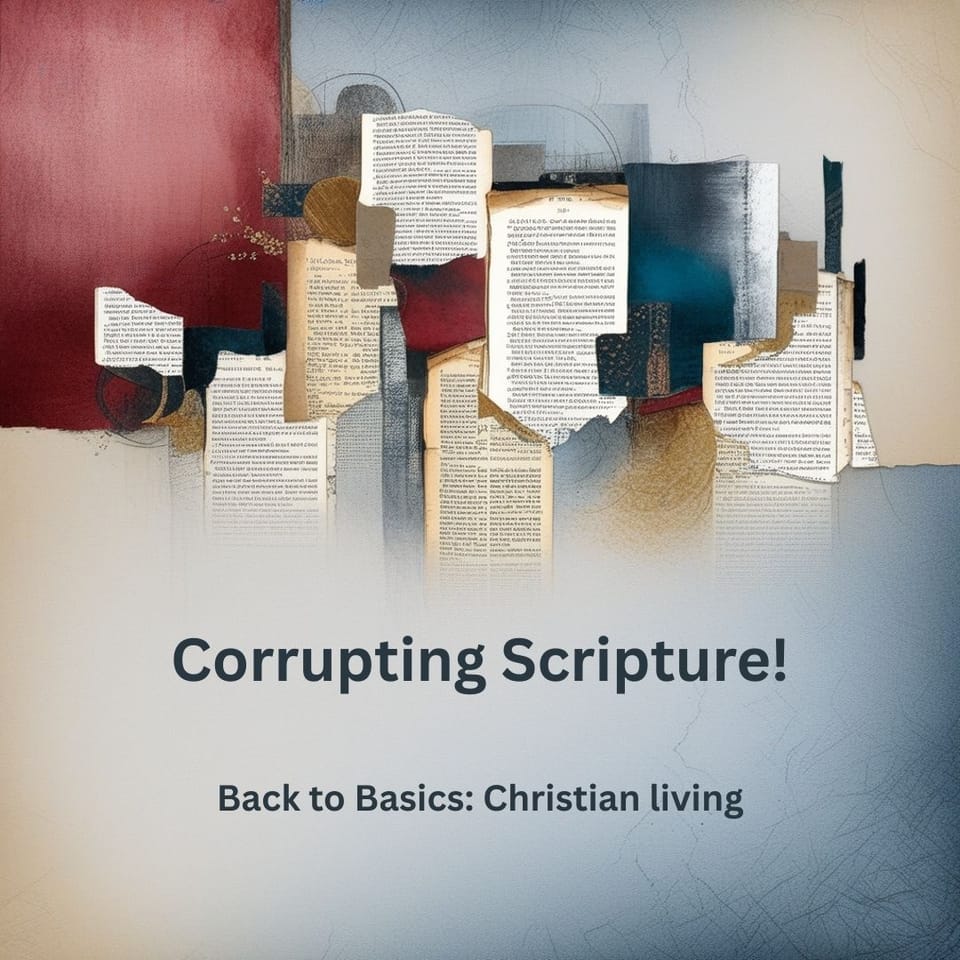Corrupting Scripture!

The Danger of Modern Bible Translations!
In an age where accessibility and readability are often prioritised over accuracy, many modern Bible translations risk corrupting the true meaning of God's Word. While making Scripture more approachable is certainly a noble goal, we must ask ourselves: at what cost? When translations prioritise contemporary language and ease of reading over faithful representation of the original text, they can inadvertently distort the very message God intended to communicate.
The Apostle Paul warned us about the importance of handling Scripture correctly when he wrote to Timothy: "Study to shew thyself approved unto God, a workman that needeth not to be ashamed, rightly dividing the word of truth" (2 Timothy 2:15 KJV). This instruction carries even greater significance today when we're confronted with numerous Bible translations that sometimes sacrifice accuracy for readability.
Consider the profound example from Colossians 1:9-10. In the authoritative King James Version, we read: "For this cause we also, since the day we heard it, do not cease to pray for you, and to desire that ye might be filled with the knowledge of his will in all wisdom and spiritual understanding; That ye might walk worthy of the Lord unto all pleasing, being fruitful in every good work, and increasing in the knowledge of God."
Compare this with modern translations like the NIV, which render these verses with subtle yet significant differences that shift the emphasis away from action and towards mere knowledge. The original text clearly shows that knowledge should lead to transformation – walking worthy of the Lord, bearing fruit in good works, and continuing to grow in our relationship with God.
The Lord Jesus Christ Himself emphasised the importance of not just knowing but doing: "Therefore whosoever heareth these sayings of mine, and doeth them, I will liken him unto a wise man, which built his house upon a rock" (Matthew 7:24 KJV). He continued with a stark warning: "And everyone that heareth these sayings of mine, and doeth them not, shall be likened unto a foolish man, which built his house upon the sand" (Matthew 7:26 KJV).
James further reinforces this principle: "But be ye doers of the word, and not hearers only, deceiving your own selves" (James 1:22 KJV). The consistent message throughout Scripture is that true faith manifests itself in action, not merely intellectual assent to certain truths.
Yet modern translations often obscure this crucial emphasis, potentially leading Christians to believe that simply knowing the right doctrines is sufficient. The Apostle Paul addressed this misconception directly: "Though I have the gift of prophecy, and understand all mysteries, and all knowledge; and though I have all faith, so that I could remove mountains, and have not charity, I am nothing" (1 Corinthians 13:2 KJV).
Another area where modern translations can lead us astray is in their handling of key theological concepts. Consider Romans 8:29-30 in the King James Version: "For whom he did foreknow, he also did predestinate to be conformed to the image of his Son, that he might be the firstborn among many brethren. Moreover, whom he did predestinate, them he also called: and whom he called, them he also justified: and whom he justified, them he also glorified."
These verses contain profound theological truths about God's sovereignty and the process of salvation. Yet some modern translations simplify these concepts in ways that can diminish their theological depth and precision.
The prophet Isaiah declared: "The grass withereth, the flower fadeth: but the word of our God shall stand for ever" (Isaiah 40:8 KJV). If God's Word is eternal and unchanging, shouldn't our translations strive to capture its meaning with the utmost accuracy and faithfulness?
This is not to suggest that the King James Version is the only acceptable translation or that everyone must read it exclusively. Rather, it is to encourage discernment when choosing which translations to rely upon. As the Apostle John advised: "Beloved, believe not every spirit, but try the spirits whether they are of God: because many false prophets are gone out into the world" (1 John 4:1 KJV).
In our quest for Biblical understanding, we would do well to compare multiple translations, especially when studying important passages. The more literal translations like the KJV, NKJV, or ESV often preserve nuances that more dynamic translations might miss. As Paul instructed the Thessalonians: "Prove all things; hold fast that which is good" (1 Thessalonians 5:21 KJV).
Consider also how modern translations sometimes handle the divine name and titles. The reverential approach of the KJV in capitalising pronouns referring to God (Him, His) reflects a deep respect for the divine that is often lost in contemporary versions. As the Psalmist wrote: "Holy and reverend is his name" (Psalm 111:9 KJV).
The corruption of Scripture through imprecise translation isn't merely an academic concern—it has practical implications for our faith and practice. If we misunderstand what God is saying to us, how can we properly respond to Him? The prophet Hosea lamented: "My people are destroyed for lack of knowledge" (Hosea 4:6 KJV).
Let us therefore approach Bible study with prayer and discernment, asking God to reveal His truth to us through His Word. As the Psalmist prayed: "Open thou mine eyes, that I may behold wondrous things out of thy law" (Psalm 119:18 KJV). Let us compare translations, study the context, and seek to understand Scripture as God intended it to be understood.
Most importantly, let us remember that the ultimate purpose of Scripture is not merely to increase our knowledge, but to transform our lives. Paul explained this to the Romans: "And be not conformed to this world: but be ye transformed by the renewing of your mind, that ye may prove what is that good, and acceptable, and perfect, will of God" (Romans 12:2 KJV).
When Paul prayed for the Colossians, he wasn't merely asking that they would accumulate information about God. He was praying that their knowledge would lead to action—walking worthy of the Lord, pleasing Him in everything, bearing fruit in every excellent work, and growing in their relationship with Him.
That is the heart of Christianity—not just knowing but doing; not just understanding but living; not just believing, but becoming more like Christ every day. As Peter exhorts us: "But grow in grace, and in the knowledge of our Lord and Saviour Jesus Christ. To him be glory both now and forever. Amen" (2 Peter 3:18 KJV).
May we all be diligent to rightly divide the word of truth, seeking accurate translations that preserve the full meaning and emphasis of God's inspired Word. For as Jesus promised: "If ye continue in my word, then are ye my disciples; indeed, and ye shall know the truth, and the truth shall make you free" (John 8:31-32 KJV).
Key Takeaways:
- Modern Bible translations often prioritise readability over accuracy, potentially distorting God's intended message.
- Scripture consistently emphasises that true faith manifests in action, not merely in knowledge or intellectual understanding.
- Compare multiple translations when studying important passages, with more literal translations (KJV, NKJV, ESV) often preserving nuances lost in dynamic translations.
- The purpose of Scripture is not just to increase knowledge but to transform lives through application.
- Approach Bible study with prayer and discernment, asking God to reveal His truth through His Word.





